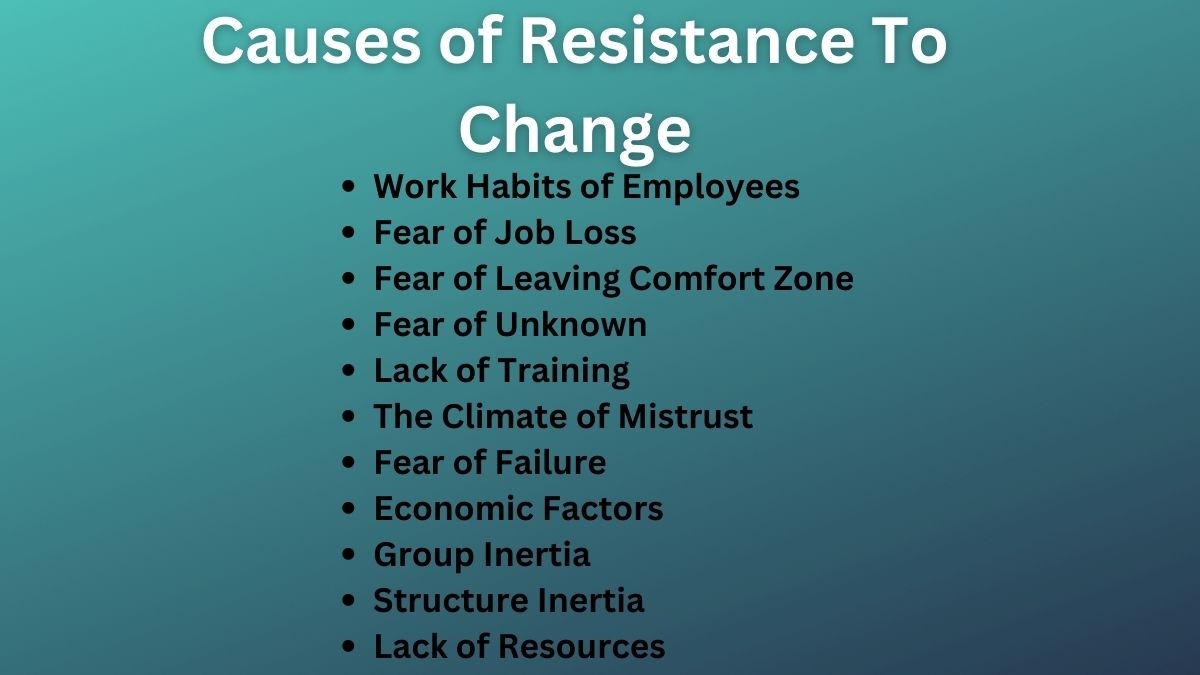11 Causes of Resistance To Change in the Workplace
Causes of Resistance To Change
Change is necessary for the organization but because of different reasons/causes employees resist it. Normally the causes of resistance to change are two – individual and organizational resistance.
Individual causes of resistance include people’s personal feelings, perceptions, and needs. And organizational causes of resistance include the organization’s structure and designs.
In addition, let’s discuss the most common causes of resistance to change in the workplace.
Work Habits of Employees
It is human nature that we prefer to work with which we are familiar. Employees do repetitively the same tasks in the organization, in this process, they are habituated to that work. In such a situation, when a change in working style is presented in the organization, they resist it.
Fear of Job Loss
Fear of job loss is also a common reason employees oppose change. When management of the organization plans to change the work process, and style, and change the present work system, many employees will feel that it may pose to their job security.
Fear of Leaving Comfort Zone
When employees are habituated to their task they also feel comfortable doing it. As such they do not want to change their job. They love their comfort zone and do not want to leave it. And, they oppose changes initiated by the management.
Fear of Unknown
Fear of the unknown is one of the most common causes of employees’ resistance to change. It is also applied in normal human life. When they do not know what the change is and why it is taking place they do not accept it.
Lack of Training
While initiating change in the organization, training should be provided to the employees about how to effectively implement that change in the organization. Training reduces the reluctance of employees about the change.
The Climate of Mistrust
When employees do not trust each other in the organization, it can be a huge barrier to change implementation. If this happens, managers must develop an environment of trust and confidence to reduce it.
Fear of Failure
If people are unsure of their capacity to adjust to a change, they won’t support it. People will oppose change when they feel threatened by their weaknesses (actual or imagined), in an effort to avoid failure.
Economic Factors
One of the causes of reluctance to change is the concern that previously achieved financial gains may be lost. As many people think that complexity comes with change, they find it challenging to adjust to new systems and practices.
They might be concerned that their duties and working hours would be reduced, which will inevitably result in lower pay.
Group Inertia
It is a common belief that when a majority of group members accept a thing the remaining members also have to accept it. As such, in the workplace, sometimes employees resist change because the majority of their group members do it.
Structure Inertia
The organization is a system of different subsystems. A change in one system inevitably affects another system. As such a system accepts or does not accept a change it also affects the performance of another system.
In addition, the bureaucratic or rigid structure of the organization is also the main source of resistance to change.
Lack of Resources
Change requires attention from the whole organization. And, it is not free also. Successful implementation of change requires investment along with effort.
Read Next: Causes of Conflict in the Organization
Sajan Kushmi is a content writer with more than 4 years of experience. He holds BIM Degree. He write on the topics related to Management, Marketing, and Entrepreneurship.






